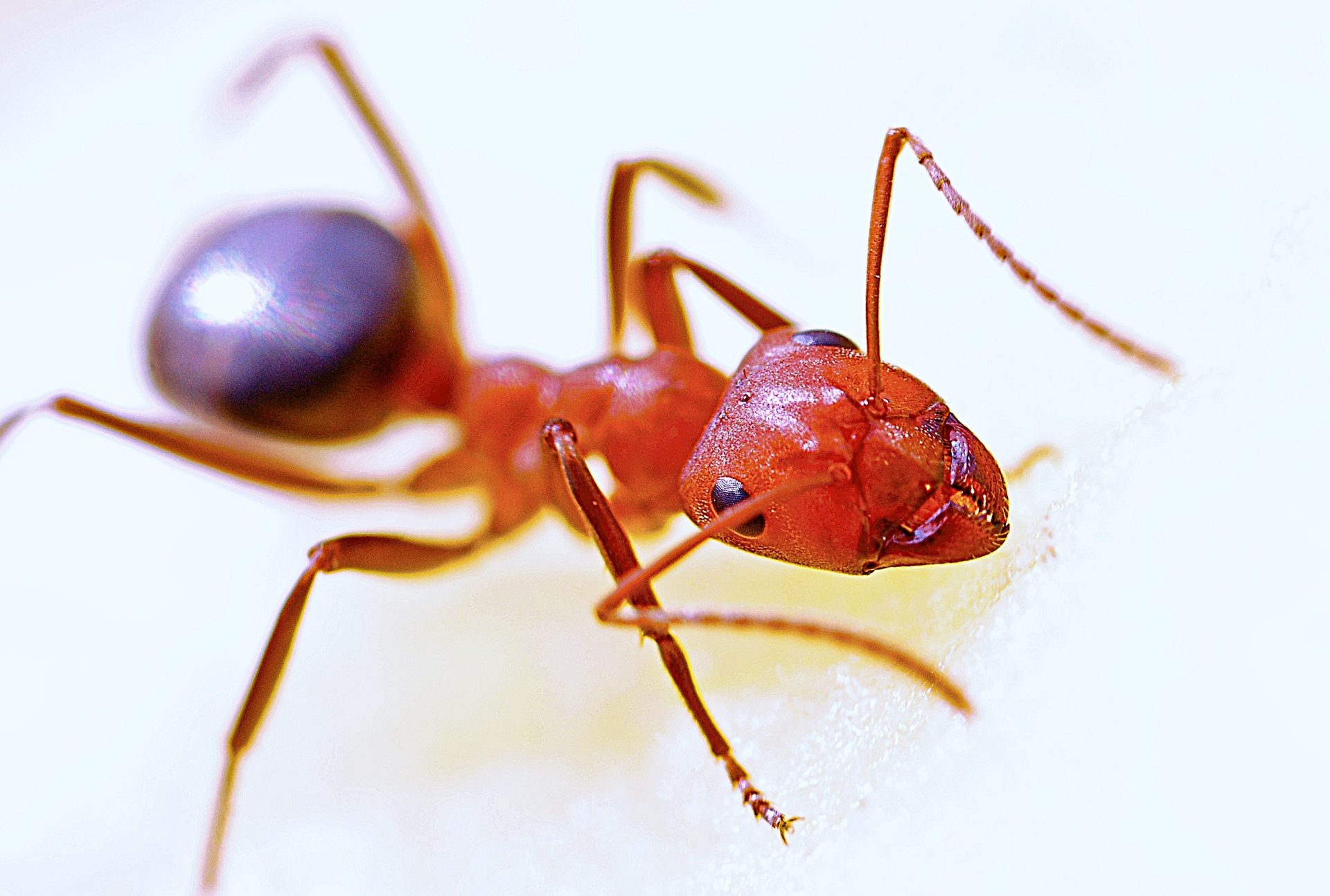There is no faster way to ruin an outdoor summer adventure then with bug bites. Fire ant bites are particularly nasty. These tiny little bugs can leave you feeling pretty miserable in just a matter of minutes. Not only are these bug bites uncomfortable and inconvenient, but they can also be quite dangerous. This article will go over everything you need to know about fire ant bites. So that next time you are out hiking, picnicking, or working in the garden you will know what to do if you are bit.
What Are Fire Ants?
There are generally two species in the United States that we refer to as “fire ants”. There is the Solenopsis invicta, or red fire ant, and the Solenopsis richteri, or black fire ant. However, any ant that has the capability to bite or sting is often lumped into the fire ant category. Both the red fire ant and black fire ant species were originally from South America, but have made there way into the United States. The red fire ant can be found in approximately 13 southeastern states. The black ant is found near the Gulf of Mexico in Mississippi, Alabama and Texas. Fire ants are small, and live in mounds of earth that can be anywhere from 18 inches to a few feet tall.
Fire Ant Bites
Fire ants are extremely territorial of their mounds. Most fire ant bites occur when a person or animal inadvertently steps or sits on their mounds. In order to protect their colony, fire ants with bite the intruder. When a fire ant bites it releases a special “alarm” pheromone which alerts other ants to attack. This means one small bug bite can quickly turn into a swarm of fire ants.
What to Do If You Encounter Fire Ants
If you find yourself being attacked by fire ants it is important to act quickly. As mentioned above, fire ants are prone to swarming. So by the time you feel the first bite, there is probably, more likely than not, already a handful of these pesky insects on your body. Your first step should be to locate the mound and distance yourself as quickly as possible. Next, physically remove as many insects as you can. Shaking, or hitting the ants will not do any good as they can lock onto your skin with their powerful little jaws. This also means they can’t be blasted off by a water hose or by jumping in nearby bodies of water. You will need to brush or pull them off. Remove any clothing if possible to remove ants that may have climbed up pant legs or shirt sleeves.
Fire Ant Bite Symptoms
A fire ant bite is easily recognizable because of a few tell-tale signs. Unlike most insects, a fire ant can bite multiple times, which technically classifies it more as a sting than a bite. Fire ants are capable of biting their victims once every 10-15 seconds. So most fire ant bites, or stings, are found in clusters. When a fire ant bites there will be an initial burst of intense pain or burning. This can last a few seconds up to a few minutes. After a while the pain will die down and is followed by intense itching and discomfort. The bites tend to swell up to become small raised bumps or blisters filled with white pus.
Allergic Reactions
The venom a fire ant injects under the skin is what causes the site to become red, inflamed and fill with pus. The fire ant’s venom is made up of different proteins, peptides and other chemical molecules with cause a mild allergic reaction in most people. This is what causes the itching and pus-filled blisters to form. However, in less than 1 percent of the population an intense allergic reaction can occur. If you find yourself contracting intense allergic reactions as a result of a fire ant bite, you should immediately seek medical attention. These symptoms include dizziness, shortness of breath, seizures, anaphylactic shock, or loss of consciousness. If you have a severe allergic reaction it may send your body into shock, so it is important to act fast. If minor allergic reactions don’t clear up within a few days you should also seek professional medical attention.
What are Effective Ways to Prevent Fire Ants from Invading My Outdoor Space?
To effectively prevent fire ants from invading your outdoor space, it’s crucial to know how to eliminate outdoor ant infestations. First, make sure to keep your yard clean and free from any food or water sources, as they attract ants. Secondly, create a barrier around your outdoor area using ant-repellent products or natural substances like vinegar or lemon juice. Lastly, regularly inspect your property for ant mounds and treat them with appropriate insecticides or follow natural control methods to combat fire ant infestations effectively.
How to Treat Fire Ant Bites
Even if you do not have an extreme allergic reaction to fire ant bites, you are still left with annoying and itchy bites. There are quite a few home remedies you can use to treat these bites. Your first step should be to wash the areas you were bit with soap and water. This will not only remove any dirt from the blisters and eliminate infection, but it will also help neutralize the sting. To relieve the pain and swelling, apply a cold compress. You can use hydrocortisone creams or an antihistamine to control small localized patches of itchiness. An oatmeal bath is another great way to relieve itching and to help calm down after a traumatic fire ant attack. The most important thing you can do to help heal quickly is to resist the temptation to scratch. Not only will it open up your blisters and increase the risk of infection, but it can cause your fire ant bites to scar.
Preventing Fire Ant Bites
There are quite a few things you can do to prevent fire ant bites. The first thing you can do is to be aware of fire ant hills. Never stomp on a fire ant mound. This will just anger the ants and cause them to swarm. If you are outside in an area known to have fire ants, make sure you are wearing hiking boots with thick socks and long pants. You can use an insect repellent that contains DEET to deter the ants from climbing up your pant legs. If you find an ant hill, leave the area. If the ant hill is in your backyard be extra cautious that small children or pets do not disturb the ant hill. Check your animals after they play outside and insure they do not have fire ants on their body when they come back indoors.
In Conclusion
Fire ant bites are more than just inconvenient, they can easily become dangerous if you are not careful. A little extra caution when you are outdoors in a fire ant prone area will go a long way to protect you and your family. If you know you are susceptible to allergic reactions to fire ant bites it may be wise to carry an epipen with you when you are outdoors. Although the fire ants are small, they are fierce. Avoiding being bit by fire ants will save you a lot of unnecessary pain this summer.
Related Article: Best Ant Killer – Our Top Choices and Overall Pick









